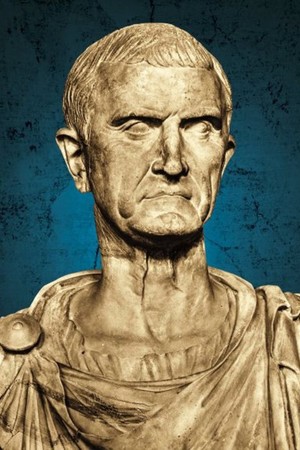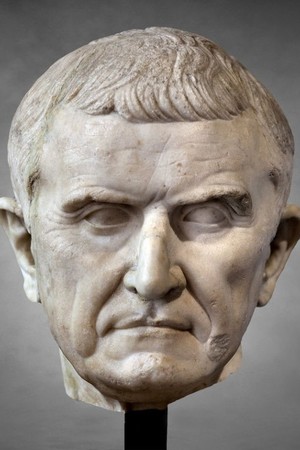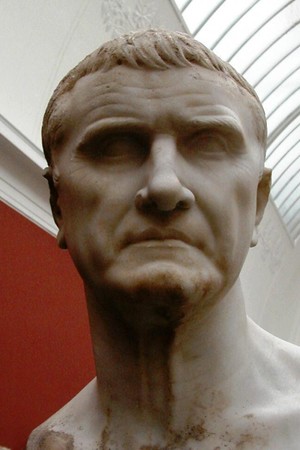Marcus Licinius Crassus
Marcus Licinius Crassus (115/114 BC - 53 BC) was a roman aristocrat belonging to the plebeian gens Licinia. Several of his ancestors were consuls, praetors, and censors.
Mark was the third son in his family but received the traditional education of a Roman aristocrat with a focus on military preparation. When his father served as governor in Farther Spain (96-93 BC), Mark accompanied him. There, he assisted his father in his affairs and established important contacts and connections that would later prove beneficial. After returning to Rome with his father, he, along with his middle brother (as the eldest brother had already passed away), took part in the Social War from 91 to 88 BC.
Mark combined his participation in the war with his career as a lawyer, successfully advocating in court sessions in Rome. However, his career was interrupted by the civil war that erupted in 88 BC between Gaius Marius and Lucius Cornelius Sulla. Mark's father supported Sulla, and as a result, both his father and middle brother lost their lives. Mark himself barely managed to escape in 87 BC and found refuge in Spain. He remained in hiding there until 84 BC, after which he began assembling a group of supporters who were opposed to Gaius Marius and his allies. Subsequently, Crassus joined Lucius Cornelius Sulla, who had landed in Italy in 83 BC. During Sulla's civil war against Marius, Crassus fought on Sulla's side. It was during this time that he encountered another prominent supporter and associate of Sulla, Pompey, with whom he began to compete since Pompey was younger and Sulla held Pompey in higher regard than Crassus.
Plutarch believes that the cause of everything was that "Crassus lacked experience, and the evil forces of greed and stinginess, which were inherent in him, ruined the splendor of his achievements." Plutarch, Life of Crassus, 6.
However, while Sulla was alive, the rivalry between Pompey and Crassus was mitigated by his participation. Surprisingly, despite the intensified rivalry between them after Sulla's death, it did not escalate into military conflict as it had between Sulla and Gaius Marius. During the subsequent proscriptions following Sulla's victory in the civil war, Mark Crassus amassed a huge fortune, making him one of the wealthiest men in Rome.
Crassus further enriched himself by investing his finances not only in land like most senators but also in real estate, slave trading, tax farming in the provinces, gold mines outside of Italy, and lending money. By lending money, Crassus expanded his political influence in Rome. With his wealth, Crassus managed to quench his thirst and demonstrate himself as a military commander, like Pompey, by funding several legions and actively participating in suppressing the Spartacus uprising (73-71 BC) in Italy, effectively leading Roman forces after a series of defeats suffered by his predecessors. Within six months, he managed to crush the rebels (by spring 71 BC). However, the laurels of the ultimate victory over Spartacus were attributed to Pompey, who returned from Spain and defeated the remnants of the gladiator forces. This added another element to the rivalry between Pompey and Crassus.
But the people forced Crassus and Pompey to reconcile, and they were both elected consuls in 70 BC. During their joint consulship, they enacted the following reforms: restoring the previous powers to the tribunes of the plebs, implementing judicial reform, and reviving the censorship. After their consulship, contrary to tradition, both consuls did not go on to become provincial governors but became private citizens. Due to a lack of sources, we do not know what Mark Crassus was occupied with between 69 and 65 BC. In 65 BC, he served as censor, and then he retreated into the shadows again until 60 BC when the First Triumvirate was formed, which included Crassus alongside Caesar and Pompey.
This is how the Roman historian Lucius Annaeus Florus writes about it in his epitomes (II, 13, 1): "Therefore, Caesar sought to conquer political influence, Crassus sought to multiply it, and Pompey sought to maintain it. Driven equally by a thirst for power in the state, they willingly united to seize it."
Later, the alliance was extended during a meeting of the triumvirs in 56 BC in the city of Luca (now Lucca in Italy). As a result of the meeting in Luca, Crassus obtained a second consulship for the following year (55 BC) and the governorship of Syria after his consulship. After his consulship, Crassus departed for his province, preparing for a military campaign against Parthia, Rome's eastern neighbor and adversary.
An Expedition to Parthia
Here's what Plutarch informs us about Mark Crassus' plans: "...Excessively arrogant and having lost his reason, he no longer limited the scope of his achievements to Syria or the Parthians; he considered Lucullus' campaigns against Tigranes and Pompey's campaigns against Mithridates as child's play, and his dreams extended as far as the Bactrians, Indians, and the sea beyond them..." (Plutarch, Life of Crassus, 16).
Having prepared the resources for his campaign against Parthia, Crassus invaded Mesopotamia in 54 BC, thus initiating a war against Parthia. He deployed 7 legions and 4,000 cavalry against Parthia. One of the cavalry units, consisting of a thousand Gallic horsemen, was commanded by Crassus' son, Publius, who had previously fought under Caesar in Gaul but was sent by Caesar to assist Crassus in his campaign against Parthia.
This military campaign against the Parthians turned out to be a failure for Crassus, as he was defeated and killed in the Battle of Carrhae (now the city of Harran, Turkey) in May 53 BC.
There are two versions regarding Crassus' death: the first one suggests that he was killed during negotiations, and molten gold was poured into his mouth, mocking his greed. (Dio Cassius, XL, 27. Roman History)
According to the second version, as stated by Plutarch, Crassus was also killed during negotiations, and his head and right hand were sent to Orodes II (the Parthian king), who at that time had reconciled with Artavasdes (the king of Armenia and a former ally of Crassus) and was feasting together with him in the Armenian capital, Artashat. The severed head was brought onto the stage before Artavasdes, Orodes, and the courtiers during a theatrical performance of Euripides' tragedy "The Bacchae" (it was carried out by an actor wearing a Thyrsus, representing the madness of Pentheus' mother, who was carrying the head of her son).
Mark Crassus in Modern Culture
The personality and fate of Mark Crassus have attracted figures in the realm of culture and art, leading to his depiction in several literary works: the novel "Spartacus" by R. Giovagnoli (1874); the novel "Spartacus" by H. Fast (1951); the novellas "Spartacus" by V. Yan (1933) and the diptych by A. Valentinov; the novel "Spartacus: Rebellion of the Unconquered" by M. Gallo (2006); the novels "Fortune's Favorites" (1993) and "The Women of Caesar" (1996) by C. McCullough. Crassus appears in a number of films dedicated to the Spartacus uprising: the 1960 film, the 2004 film, and the 2013 TV series about Spartacus. In the 1960 film "Spartacus," the role of Crassus was played by Laurence Olivier, in the 2004 film "Spartacus," it was portrayed by Angus Macfadyen, and in the TV series "Spartacus: War of the Damned" (2013), the role was played by Simon Merrells.
Related topics
Roman Republic, First Triumvirate
Literature
1. Lucius Annaeus Flor. Small Roman Historians, Moscow: Ladomir Publ., 1996, pp. 99-190.
2. Appian of Alexandria. Roman History, Moscow: Ladomir Publ., 2002, 880 p.
3. Pliny the Elder. Natural history.
4. Plutarch. Comparative biographies — Moscow, 1994.
5. Gaius Sallust Crispus. About Catilina's plot // Caesar. Sallust, Moscow: Ladomir Publ., 2001, pp. 445-487.
6. Gaius Suetonius Tranquillus Life of the Twelve Caesars // Suetonius. The Lords of Rome, Moscow: Ladomir Publ., 1999, pp. 12-281.
7. Marcus Tullius Cicero. About your responsibilities // About old age. About friendship. On duties, Moscow: Nauka Publ., 1974, pp. 58-158.
8. Marcus Tullius Cicero. Three Treatises on Oratorical Art, Moscow: Ladomir Publ., 1994, pp. 75-272.
9. Goroncharovsky V. Spartak's War. St. Petersburg: Peterburgskoe vostokovedenie Publ., 2011, 176 p. (in Russian)
10. Leskov V. Spartak, Moscow: Molodaya gvardiya Publ., 2011, 350 p.
11. Livshits G. Socio-political struggle in Rome in the 60s of the first century BC and the Catiline conspiracy. Minsk: BSU Publishing House, 1960, 208 p.
12. Lyubimova O. Konflikt Krass i Pompey v 70-e g. B.C.: ego vozrozhdenie i prichiny [The conflict between Crassus and Pompey in the 70s BC: its origin and causes]. Studia Historica, 2013, no. 13, pp. 136-157.
13. Lyubimova O. Krass-korystolyubets: k voprosu ob obraze Crassus v traktate Tsitserona "Paradoxes stoikov" [Krass-the mercenary: on the question of the image of Crassus in Cicero's treatise "Paradoxes of the Stoics"]. 2014, No. 2, pp. 34-53.
14. Lyubimova O. Mark Licinius Crassus and the Plebeian tribunes of the 70s of the first century BC. 2013, No. 2, pp. 148-157.
15. Lyubimova O. "The First conspiracy of Catilina" and Mark Licinius Crassus. 2015, No. 17, pp. 151-175.
16. Lyubimova O. Letter of Crassus on the challenge of Pompey and M. Lucullus against Spartacus: time and circumstances of writing // Bulletin of the Humanities University. 2013, No. 2, pp. 73-84.
17. Mommsen T. The history of Rome. St. Petersburg: Nauka Publ., 2005, vol. 3.
18. Utchenko, S. The Crisis and Fall of the Roman Republic, Moscow: Mysl, 1965, 288 p.
19. Bradley K. Review: Marcus Crassus and the Late Roman Republic by Allen Mason Ward // The Classical Journal. — 1979. — № 75, 1. — С. 66—67.
20. Cadoux T. Review: Marcus Crassus, Millionaire by F. E. Adcock // The Journal of Roman Studies. — 1967. — № 57, 1/2. — P. 285.
21. Cambridge Ancient History. — Cambridge: Cambridge University Press, 1976.
22. Gledhill M. The political biography of Marcus Licinius Crassus. — Madison: University of Wisconsin-Madison, 1929.
23. Marshall B. Crassus: a political biography. — Amsterdam: A. M. Hakkert, 1976.
24. Marshall B. Crassus and the Cognomen Dives // Historia. — 1973. — № 22, 4. — С. 459—467.
25. van Hooff A. Review: Marcus Crassus and the Late Roman Republic by A. M. Ward // Mnemosyne. Fourth Series. - 1982. - No. 35. - pp. 202-204.
26. Ward A. Marcus Crassus and the Late Roman Republic. — Columbia—London: University of Missouri Press, 1977. — 323 с.
27. Plutarch. Comparative biographies — - Moscow, 1994. the same can be applied to Pompey. source





